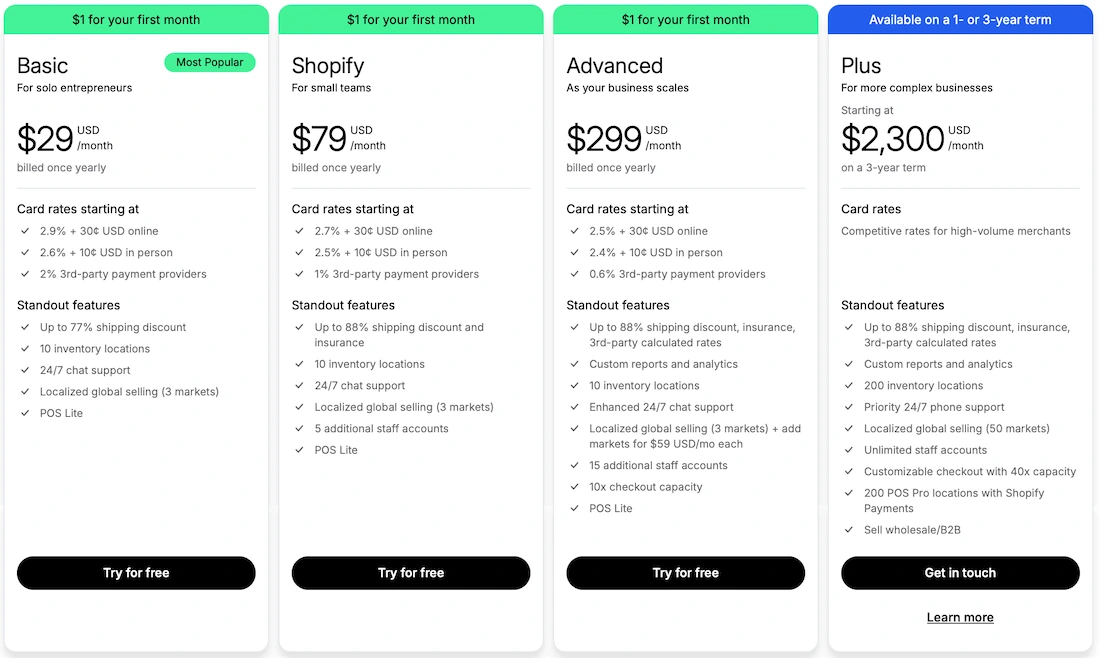Shopify offers a range of pricing plans to accommodate businesses of various sizes and needs. Here’s a detailed breakdown to help you understand the costs and features associated with each plan. Also Read until the end to learn how to start with Shopify for $5 per month.
Biggest differences between plans
- The amount paid for credit card transaction goes down with more expensive plans
- The number of staff accounts. With the basic plan you only have one user account
- After the advanced plan the checkout capacity is increased
How much does Shopify cost per month?
All account tiers come with a 3 day free trial and $1 dollar for the first month
- Starter Plan: It is $5 per month. It is used to validate a business idea. It includes product pages, a contact page, and Shopify’s fast and secure checkout.
The Starter Plan is not available as one of the options. Go to Shopify.com and then click on Pricing and scroll down until you find Starter Plan
- Basic Plan: $29 per month when billed annually. $39 when paid monthly. It includes features necessary to create an online store, ship products, and processpayments.
- Shopify Plan: $79 per month when billed annually. $105 when paid monthly This plan offers professional reporting and additional staff accounts, suitable for growing businesses.
- Advanced Plan: $299 per month when billed annually. $399 when paid monthly. It provides advanced reporting, the lowest transaction fees, and more robust features for scaling businesses.
- Shopify Plus: Starting at $2,300 per month on a 3-year term. Designed for enterprise-level businesses, it offers advanced customization and support.
What is Shopify $1 dollar for the first month?
As of October 31, 2024, Shopify reintroduced a promotional offer allowing new merchants to access the platform for $1 per month for the first month after a 3-day free trial. This limited-time deal enables businesses to explore Shopify’s features at a minimal cost during the initial period.
What is a Shopify subscription?
A Shopify subscription grants access to Shopify’s e-commerce platform, enabling businesses to set up and manage online stores. Depending on the chosen plan, subscribers receive various features, including website hosting, payment processing, inventory management, customer support, and marketing tools. The subscription model is tiered, allowing businesses to select a plan that aligns with their operational needs and budget.
How much is Shopify Plus?
Shopify Plus is tailored for high-volume, enterprise-level businesses requiring advanced features and support. The subscription fee starts at $2,300 USD per month or 0.25% of sales if monthly revenue exceeds $800,000 USD, whichever is higher. This plan offers enhanced capabilities, including a customizable checkout experience, priority support, and advanced API access.
Is there a cheaper Shopify plan?
Yes, the Starter Plan is Shopify’s most affordable option at $5 per month. It allows users to sell products through social media and messaging apps without the need for a full online store, making it suitable for individuals or small businesses seeking a cost-effective entry into e-commerce.
How to get Shopify free for 3 months?
Shopify does not offer a free 3-month period. However, as of October 31, 2024, new users can start with a 3-day free trial, followed by a promotional rate of $1 per month for the first three months. This offer allows merchants to test the platform’s features with minimal initial investment.
Is Square or Shopify better?
The choice between Square and Shopify depends on your business needs:
- Shopify: Renowned for its comprehensive e-commerce solutions, Shopify offers robust online store capabilities, a wide range of integrations, and scalability for businesses aiming to grow their online presence.
- Square: Initially focused on point-of-sale (POS) solutions for in-person transactions, Square has expanded to include online selling tools. It is often favored by small businesses that prioritize in-person sales with occasional online transactions.
Consider your primary sales channels, required features, and long-term business goals when choosing between the two platforms.
Who is Shopify’s competition?
Shopify’s main competitors in the e-commerce platform market include:
- WooCommerce: An open-source WordPress plugin that enables users to build customizable online stores.
- BigCommerce: A SaaS platform offering comprehensive e-commerce solutions for various business sizes.
- Magento (Adobe Commerce): A flexible, open-source e-commerce platform suitable for businesses requiring extensive customization.
- Wix eCommerce: A website builder with integrated e-commerce functionalities, ideal for small to medium-sized businesses.
- Squarespace: Known for its design-oriented templates, Squarespace offers e-commerce capabilities for businesses emphasizing aesthetics.
Is Shopify worth the fees?
Yes! Shopify’s fees justified by the platform’s extensive features, reliability, and scalability. It offers a user-friendly interface, a wide range of integrations, and robust support, enabling businesses to efficiently manage and grow their online presence.
Start with the Basic Plan to assess your business needs, budget, and growth plans to determine if Shopify aligns with your objectives and offers a return on investment that meets your expectations.
Shopify has certain SEO limitations that can affect your store’s visibility in search engine results. While there are SEO plugins available, they often lack the comprehensive functionality required by search engines like Google and Bing to effectively index and rank your pages. Consequently, attracting visitors to your store may require leveraging alternative marketing channels.
Some common SEO challenges with Shopify include:
- Restricted URL Structure: Shopify enforces a flat URL structure, limiting customization and potentially impacting SEO performance.
- Duplicate Content: Automatically generated duplicate content can confuse search engines and dilute page authority.
- Limited Metadata Control: There are constraints on editing title tags and meta descriptions, which are crucial for SEO optimization.
Addressing these issues often requires technical adjustments or third-party applications to enhance your store’s SEO capabilities.
Conclusion
Shopify is the best online store platform in the internet. It provides all the necessary tools for operating an online store, requiring minimal technical skills. It provides a variety of pricing plans and features tailored to different business requirements.
Understanding these options and recent promotions can help you make an informed decision that best supports your e-commerce goals.












